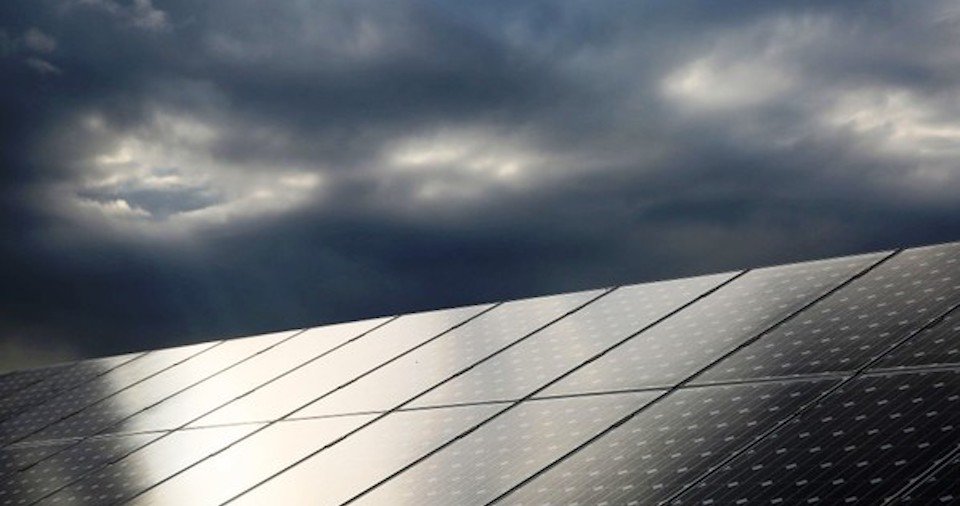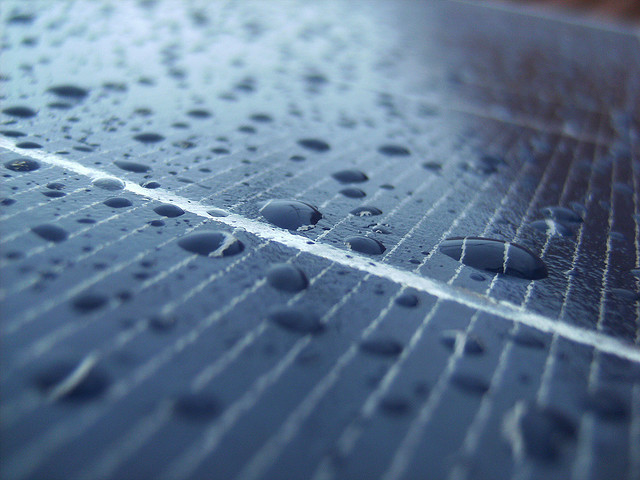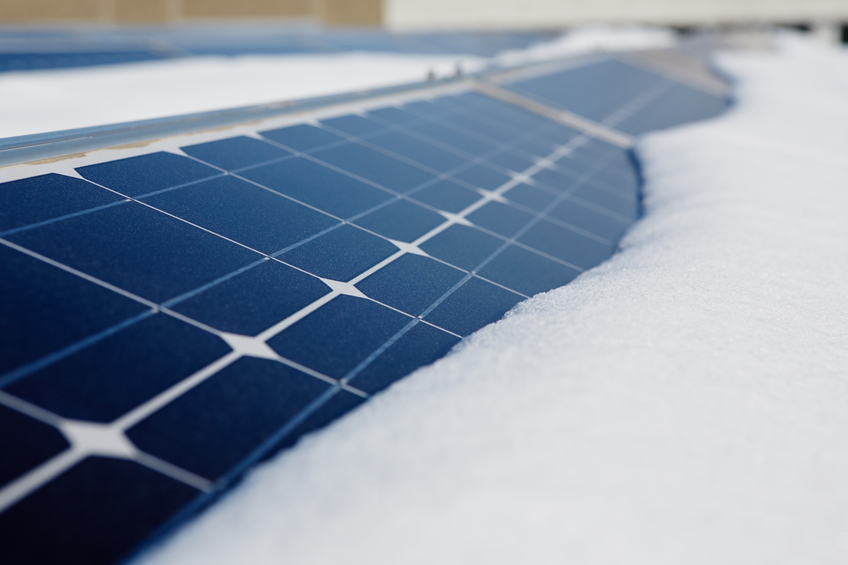 Loading... Please wait...
Loading... Please wait...Products
- Solar Panel Kits
- Solar Products
- Solar Panels
- Inverters
- Batteries
- Racking and Mounting
- Rails
- Flashings
- Splice Kits
- Stopper Sleeves
- Conduit Mounts
- Attachments
- Brace Assembly
- Base Mount
- Brackets
- Bolts
- Clamps
- Caps
- L-Feet
- Washers
- Skirt
- Lugs
- Tilt Legs
- Hooks
- Stand-Offs
- Ballast Bay
- Top of Pole Mount
- Side of Pole Mount
- Flush Mount Kits
- Ground Mount Kits
- Roof Mount Kits
- Hardware Packages
- Wire Management
- Solar Generators
- Inverter Monitoring
- Inverter Accessories
- Battery Accessories
- Charge Controllers
- Tools and Supplies
- View All Products
Solaris Blog - Solar Panel Efficiency
Solar Panel Performance: Clouds, Rain and Snow
Posted by Justin Bye on 19th Mar 2019

Your solar panels performance and efficiency matters. That’s why you want to know if solar panels will work in adverse weather conditions, such as cloudy days, rainy days or snowy days. This is an important question to ask, as these weather conditions can affect your PV module energy production, and as a result - dampen the return on investment for your solar panels.
First thing to know is your solar panels will indeed perform in cloudy environments, during rain, and in the winter if and when there is snow, likely with limited performance. What matters is how much solar light is being prevented from reaching the solar panels, you see, solar panels need sun light and solar radiation to function properly.
Let’s explore by taking a closer look at how solar panels might better perform during each of these environmental conditions, and better understand how your solar energy system might be affected by the difference in adverse weather conditions, and the subsequent impact to a solar panels efficiency.
Do solar panels work on cloudy days?
As long as the sun is up during day time hours, and your solar panel is exposed to direct or indirect sunlight, then yes – your solar panels will work on cloudy days. However, the modules performance will be reduced depending upon how much of the sun’s light is prevented from reaching the solar cell.
Generally, it’s estimated that a solar panel will typically produce 10% to 25% of their rated wattage during a cloudy day. This does assume the clouds are obstructing a high amount of sun light. Of course, a solar panel will most likely perform better during partly cloudy conditions, or when it is cloudy only for a short period of time.
It is important to note, solar panels may have moments of increased efficiency during cloudy days. This is caused by a “silver lining” effect, which happens when to sun’s light passes over the edge of a cloud, which results in magnifying the sunlight. This in turn causes the solar panel to experience a temporary boost in performance and power output. Days with rain and snow can experience the same phenomenon as well.
Solar panels will work on cloudy days, just with less efficiency than on a clear and sunny day.
Do solar panels work on rainy days?

Similar to cloudy days, solar panels do also work in the rain – just to a lower efficiency. This assumes while raining it is heavily clouded outside as well. If this is a sun shower for example, then solar panels may still perform fairly well with low obstruction.
Coincidentally, rain may also wash away built up debris like dirt and dust that may hinder your solar panels performance overtime in normal sunlight conditions, (which is why it’s important to maintain your solar panels). So, a little rain might help your solar panel efficiency after a rain.
Solar panels will work on a rainy day, with likely temporary hindered performance.
Do solar panels work on snowy days?

Once enough is accumulated, snow will vastly hinder the performance and efficiency of solar panels. If the glass window is covered in enough snow, sunlight cannot make it to the solar cell – thus vastly decreasing or halting energy production down all together.
Cold conditions, however, can actually improve your solar panels output. As with most electronics, colder temperatures can improve performance. Once the temperature drops below 77 degrees F, which is standard for most solar panel ratings, their voltage increases. Although if it’s winter, then your PV array is most likely already producing less energy due to shorter daylight sun hours. While it’s snowing, module performance is usually lightly impacted, it’s only when snow piles upon the module that it prevents energy gathering by the solar cell.
However, clearing the module and having snow surrounding the area can actually reflect more light thus causing the solar panel to exceed its total standard output and effectively produce more power from the increased sun light and iridescence.
Solar panels will work on snowy days, unless enough snow gathers upon the module and blocks sunlight.
What should you do if you live in a cloudy or rainy environment?
Good news is, when you go forward to size your system, you will find that a solar array is designed and sized to consider your local weather patterns, sun hours, shade analysis and more. A solar energy system with all of these factors taken into account will perform just as well on an annual basis.
Another thing to keep in mind is that with a good net metering policy, the days of cloudy weather, rain, snow, or low sun hours will be balanced out through your electric company. Offsetting your energy usage seasonally will effectively keep your electric bill at zero or reduced by how many kWh your system can produce each year assuming it’s less than your total electric needs.
Some solar panels are also specifically built to perform in low irradiance environments. So, if you live up in a northern sun hour zone that receives less solar radiation, (especially in the winter), then it may be beneficial to consider installing modules meant to withstand this task.
Note: Net metering enables your home to remain connected to the electric grid, your system will feed excess energy produced to your utility (and/or battery for hybrid) and will generate credit for you. When you need to draw more energy than you produce in a given month, you will take from the credit issued.
Are solar panels able to withstand adverse weather conditions?
All solar panels manufactured in a tier-one solar plant will generally be certified UL, CE, and IEC (among others), and usually able to withstand heavy snow loads of up to 5400 Pa, wind loads of up to 2400 Pa, and handle hail sized up to 1 inch travelling at up to 50 mph (minimum standards). However, many modules will be built to withstand even more inclement weather conditions.
Solar panels will have this relevant information available on their specification sheets or on their warranty statements. Scroll down to the bottom of our product pages to find these documents to download. Alternatively, we have listed some of these modules below.
What solar panels are best for clouds, rain and snow?
Here is a list of a few solar panel manufacturers we carry that are meant to handle clouds, rain and snow with ease:
Canadian Solar, Hanwha Q Cells, LG Solar and Panasonic.
*We especially like Canadian Solar’s quality-built modules that deliver value and reliability, and their panels are built to exceed in low irradiance weather conditions. All of our modules, however, will also perform this task well.
Conclusion
Solar panels are meant to perform in different environments, however, they will be negatively impacted and not operate at full power with clouds, rain or snow. As such, the right solar energy system will be designed to work efficiently in your location and made for your unique environment. Net metering is important, and you should make sure to understand if your utility offers it, and the rules surrounding their specific policy. Make sure to size your system and use preferred solar components for your PV array.



